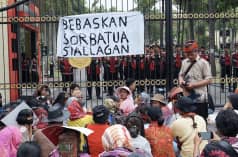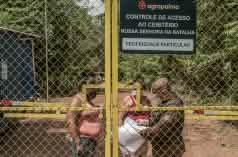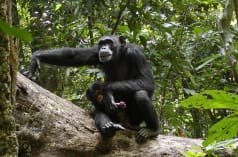Biologists Oppose Road Planned by Oil Company in Ecuador Park
http://www.nytimes.com/2005/02/17/international/americas/17forest.html?oref= login February 17, 2005 Biologists Oppose Road Planned by Oil Company in Ecuador Park By ANDREW C. REVKIN New York Times Some of the world's leading tropical biologists are calling for a halt to oil company road-building projects in and around Yasuní National Park in Ecuador, an Amazon tract harboring an extraordinary array of plant species and rare wildlife. In letters this week to the Ecuadorean government and to oil company officials, the biologists said a 33-mile road planned by the Brazilian company Petrobras and approved by Ecuador would create "a completely new artery through primary rain forest into a virtually undisturbed part of the park." The signers included the primate specialist Dr. Jane Goodall and the evolutionary biologist Dr. E. O. Wilson. The park, twice the size of Rhode Island, was created in 1979 and designated a United Nations Biosphere Reserve in 1989. One oil road was built into the park a decade ago, and in 2000 a study by biologists from the University of California, Davis, showed that it tripled hunters' access to rare woolly monkeys. "There clearly are viable alternatives, such as directional drilling or roadless methods, that can allow one to access remote oil reserves without severely degrading one of the great jewels of the Amazon," said Dr. William F. Laurance, a biologist at the Smithsonian Tropical Research Institute in Panama and president-elect of the Association for Tropical Biology and Conservation, the largest scientific group promoting research in the field. The group voted unanimously last month to ask Ecuador to cancel its approval of the road. "It's difficult to overstate the importance of Yasuní," Dr. Laurance said. "It's arguably the biologically richest real estate on the planet. You can hardly walk 50 yards in any direction without tripping over some rare plant or an endangered species. Where else can you find 300 species of trees in an area no bigger than two football fields?" The letter sent this week also complained about roads being built north of the park in a drilling area called the Edén-Yuturi field, which is being developed by Occidental Petroleum. Occidental has spent more than $900 million to seek and tap reserves north of the park. It said yesterday that its road network would not enter the park and was not linked to the outside world so it could not be a conduit for rogue loggers or settlers. Petrobras said at first it had not planned an access road through the park, but changed its mind after specialists on a technical advisory group, park officials and Ecuador's Environmental Ministry recommended a road so the government would have better access to the area and could better patrol it to prevent new development. Hugo Giampaoli, Petrobras's manager for Ecuador, said the company had worked in the region for some time and had done no significant environmental damage. "We are very conscious that the Yasuní National Park is a very important area, rich in biodiversity," he said, "and that is why we are taking so many precautions in order to ensure sustainable development." Todd Benson contributed reporting from São Paulo, Brazil,for this article.










